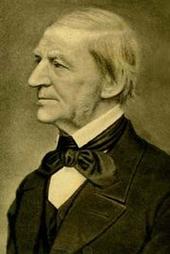Ralph Waldo Emerson was born in 1803 in Boston, Ma he is best known as the center of the American transcendental movement setting out most of its ideas and values in Nature, published in 1836. In the same year (September 1836) Emerson and other like-minded intellectuals founded the Transcendental Club, which served as a center for the movement. He, Bronson Alcott, and George Ripley published a magazine, The Dial.
In 1838 he was invited to speak at Harvard's Divinity Hall graduation, which came to be known as his Divinity School Address. His remarks managed to outrage the establishment and shock the whole Protestant community at the time, as he proclaimed that while Jesus was a great man, he was not God. For this, he was denounced as an atheist, and a poisoner of young men's minds. Despite the roar of his critics, he made no reply, leaving it to others for his defense. He was not invited back to speak at Harvard for another 40 years, but by the mid-1880s his position had become standard Unitarian doctrine.
Emerson made a living as a popular lecturer in New England and the rest of the country outside of the South. During several scheduled appearances that he was not able to make, Frederick Douglass took his place. Emerson spoke on a wide variety of subjects. Many of his essays grew out of his lectures.
Emerson associated closely with Nathaniel Hawthorne and Henry David Thoreau and often took walks with them in Concord. Emerson encouraged Thoreau's talent and early career. The land on which Thoreau built his cabin on Walden Pond belonged to Emerson. While Thoreau was living at Walden, Emerson provided food and hired Thoreau to perform odd jobs. When Thoreau left Walden after two years' time, it was to live at the Emerson house while Emerson was away on a lecture tour. Their close relationship fractured after Emerson gave Thoreau the poor advice to publish his first book, A Week on the Concord and Merrimack Rivers, without extensive drafts, and directed Thoreau to his own agent who made Thoreau split the price/risk of publishing. The book was a flop, and put Thoreau heavily into debt. Eventually the two would reconcile some of their differences, although Thoreau privately accused Emerson of having drifted from his original philosophy, and Emerson began to view Thoreau as a misanthrope. Emerson's eulogy to Thoreau is largely credited with the latter's negative reputation during the 19th century.
Emerson was noted as being a very abstract and difficult writer who nevertheless drew large crowds for his speeches. The heart of Emerson's writing was his direct observations in his journals, which he started keeping as a teenager at Harvard. The journals were elaborately indexed by Emerson. Emerson went back to his journals, his bank of experiences and ideas, and took out relevant passages, which were joined together in his dense, concentrated lectures. He later revised and polished his lectures for his essays and sermons.
He was considered one of the great orators of the time, a man who could enrapture crowds with his deep voice, his enthusiasm, and his egalitarian respect for his audience. His outspoken, uncompromising support for abolitionism later in life caused protest and jeers from crowds when he spoke on the subject. He continued to speak on abolition without concern for his popularity and with increasing radicalism. He attempted, with difficulty, not to join the public arena as a member of any group or movement, and always retained a stringent independence that reflected his individualism. He always insisted that he wanted no followers, but sought to give man back to himself, as a self-reliant individual. Asked to sum up his work late in life, he said it was his doctrine of "the infinitude of the private man" that remained central.
Emerson's health started to fail after the partial burning of his house in 1872. He made his last tour abroad in 1872-1873, and then withdrew more and more from public life. Emerson died on April 27, 1882 in Concord.
